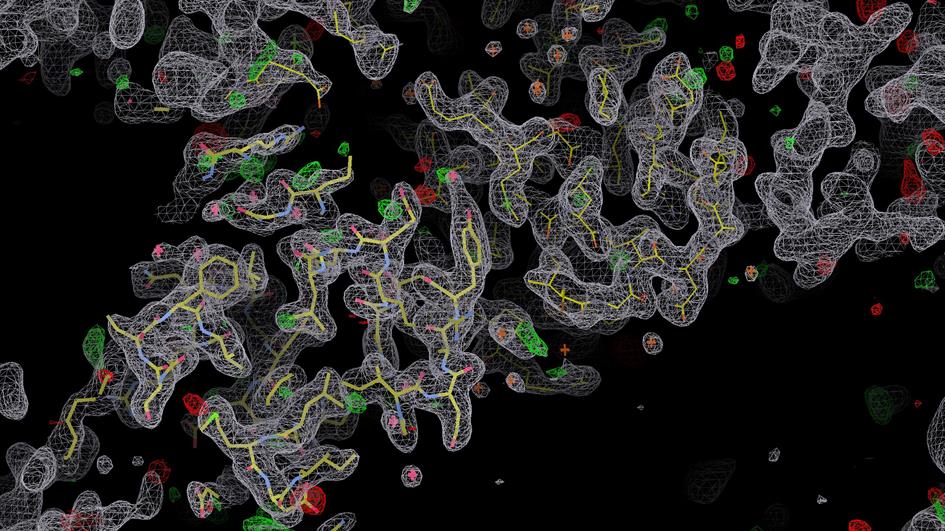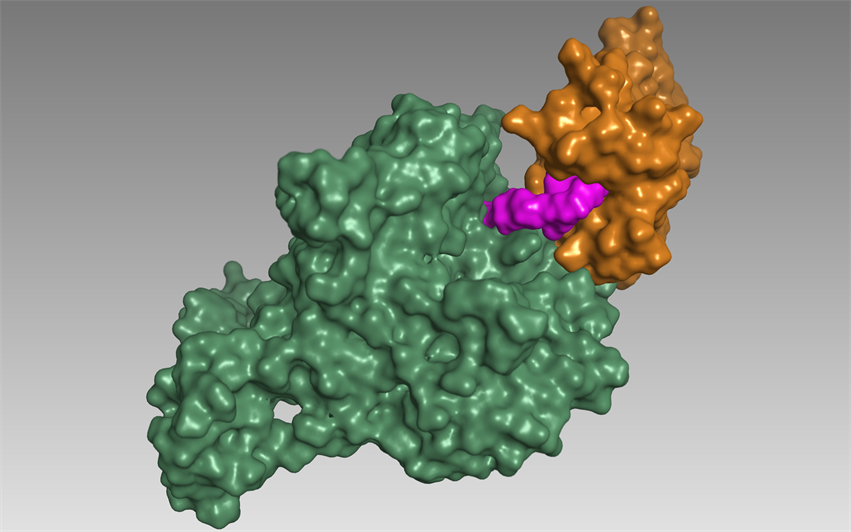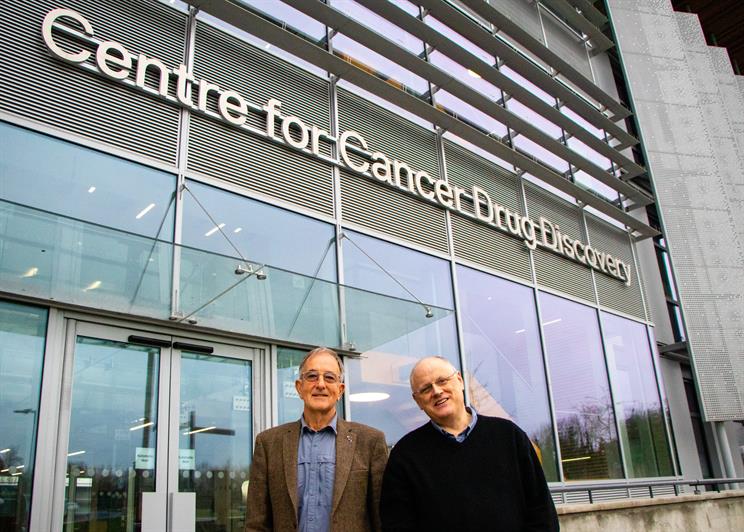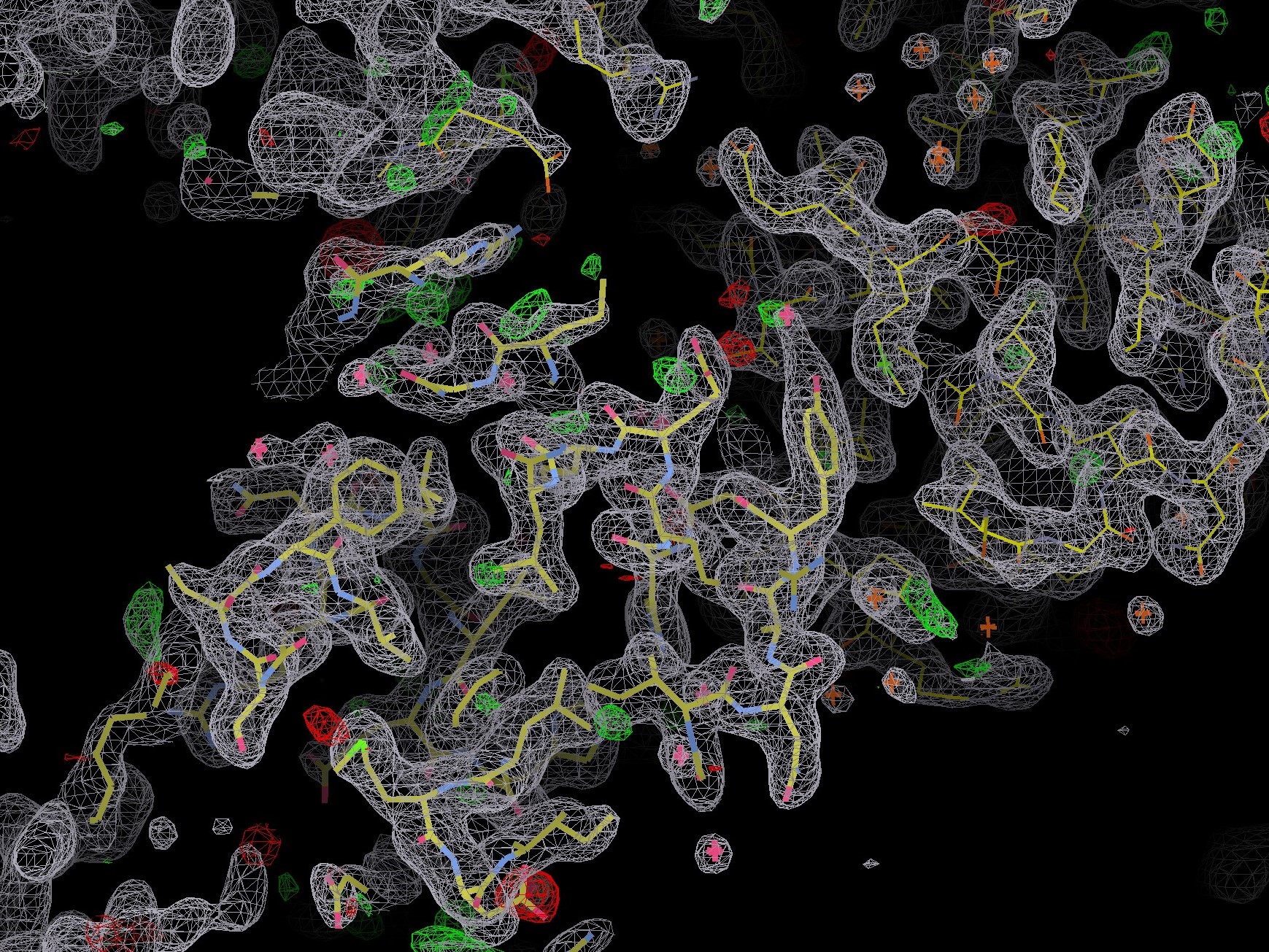
Image: a crystal structure of a protein used for drug design
Deadly and currently undruggable cancer proteins will be the focus of a new research centre dedicated to opening up new approaches to cancer treatment, and made possible by a major philanthropic donation.
Scientists at the centre will accelerate research in one of the most promising new areas of drug discovery – targeted protein degradation – to discover new research tools and new treatments for hard-to-treat cancers that can work highly precisely.
The new Centre for Protein Degradation was made possible by a £9 million donation to The Institute of Cancer Research, London – which is a charity as well as a world-leading cancer research institute.
The major donation, given by David and Ruth Hill, who want to make a difference in the world, will fund a four-year programme of research led by more than 15 drug discovery and cancer biology researchers. It is part of a wider campaign of fundraising, philanthropy and commercial partnership seeking support for the world-leading programme of cancer drug discovery at The Institute of Cancer Research (ICR).
The Hills have been supporting the ICR with smaller donations since the mid-2010s but knew that they wanted to give a much larger gift. They recognised the urgent need for new types of cancer treatment and that this promising area of research, combined with the ICR’s proven track record, could help make the difference. The Hills were particularly keen on the potential for protein degradation treatments to benefit people with other diseases as well.
Philanthropic donations can make a transformational difference to our cancer research and help improve the lives of people with cancer.
Find out more about philanthropy
Targeting harder to treat cancers
Recent data released by the Less Survivable Cancers Taskforce, which represents six less survivable cancers – lung, liver, brain, oesophageal, pancreatic and stomach – showed that, on average, only 16 per cent of people with one of these cancers lives for five years. For other common cancers, the average five-year survival rate is much higher at 69 per cent.
The Centre for Protein Degradation will be based in the ICR’s Centre for Cancer Drug Discovery – which houses the world’s first drug discovery programme dedicated to overcoming cancer evolution and drug resistance.
Led by Professor Ian Collins, Head of Chemistry in the ICR’s Cancer Therapeutics Unit, scientists at the new centre will work on different emerging technologies to hijack the normal waste disposal process of protein destruction in cells so that it wipes out cancer proteins that conventional targeted treatments have been unable to block.

Image: Computer model used to design a molecular glue compound (magenta) that brings together an E3 ligase (green) with a protein (orange) targeted for degradation
Most modern cancer treatments work by targeting proteins that are crucial to cancer’s growth and spread and stopping them from working – often by blocking a key part of the protein molecule. But some proteins are effectively undruggable using current approaches, and that means that many cancer patients do not have access to targeted treatments.
But protein degraders have a completely different way of attacking cancer – not by blocking the function of proteins, but by wiping them out completely. This approach has already proved effective at targeting some of these undruggable proteins – for example transforming treatment for the blood cancer myeloma – and there are hopes that it can lead to treatments for many more cancer types.
The ICR’s researchers also believe their findings could have medical benefits beyond cancer – for example, by tackling the accumulation of abnormal proteins in the brain that is common to several neurodegenerative diseases.
A visionary donation in transformative research
The transformational donation will allow the ICR to recruit researchers who will join existing research teams and work on a wide variety of protein degradation projects. The ICR will also recruit a new team that will be dedicated to working on novel technologies for targeted protein degradation treatments – ensuring the ICR remains at the forefront of drug discovery.
The gift will also ensure that the technology expertise in protein degradation will be available for all scientist at the ICR thereby increasing the chances of success.
The new centre’s interdisciplinary team will include chemists, biologists, and artificial intelligence (AI) experts, and take advantage of the ICR’s existing proteomics and advanced imaging expertise. Specifically, they will work towards the following aims:
- Apply a wide range of protein degradation technologies across the ICR so that it can benefit fundamental discovery science as well as translational research
- Discover new approaches for targeted protein degradation to advance the field for cancer research specifically and other human diseases generally

Image: David Hill and Professor Ian Collins stand in front of the ICR's Centre for Cancer Drug Discovery where the new Centre for Protein Degradation will be based.
Professor Ian Collins, Head of Chemistry in the Cancer Therapeutics Unit at the ICR, said:
“This incredibly generous donation will create a nucleus of scientists driving collaborative research on applying targeted protein degradation to cancer research – and should allow us to create new types of drugs for patients whose cancers can’t be treated with conventional technologies.
“We’re hugely thankful to the Hills for their generosity and their trust in us, and the wider ICR, to deliver on their vision. They have listened to us and made helpful suggestions – I hope this will be an ongoing relationship as we make progress in the new centre towards new treatments that will save and improve lives.”
Professor Kristian Helin, Chief Executive of the ICR, said:
“Protein degradation is one of the most promising new approaches in cancer drug discovery, and we think it has huge potential to treat cancer more effectively and with fewer side effects. We will owe any discoveries we make in the new centre to the visionary generosity of the Hills, who wanted to invest in a research institute with a proven track record but also in a project that could make a real difference for cancer patients, and even for diseases beyond cancer.
“These new therapies offer the opportunity to go after cancers that are currently hard to treat because the proteins driving the disease are so difficult to drug. We also believe the approach can have wider medical benefits – for example in destroying the proteins that build up in the brain in neurodegenerative diseases.
“Our new centre will benefit the entire ICR – not only by driving forward drug discovery, but also by making protein degradation technologies available as new tools for understanding the underlying biology of cancer by selectively removing specific proteins. As a discovery scientist myself, I am using protein degradation technologies and I see huge potential for use of newly developed second generation technologies to give us new fundamental insights into cancer, which can lead eventually to further advances in treatment for patients.”
David and Ruth Hill, a retired couple originally from Cumbria, who have been making donations to UK medical charities since 2007, made the new centre possible through a major philanthropic donation – following the sale of a business park in Oxfordshire.
David said:
“We have been donating to the ICR for several years and built a close relationship with their senior leadership. The ICR is a global centre of research excellence and, with the prospect of selling Grove Business Park, Oxfordshire, we consulted with the ICR and agreed the details of a four-year drug discovery programme. The programme is focussed on delivering treatments for as yet untreatable cancers and is likely to benefit research into other diseases. The work will be carried out in the UK by a dedicated, multi-disciplinary team of highly skilled researchers using world-leading technologies, including artificial intelligence.
“The ICR team quickly understood our objectives and were very responsive in establishing this research programme. We have a shared common goal, to maximise the research benefits to improve the lives of all humankind. Medical research is long term and very expensive but the benefits to everyone’s health is incalculable. We would encourage anyone in a position to assist in similar lifesaving research projects not to hesitate and to speak to the ICR without delay to discuss how they too can help the ICR improve the life chances for everyone.”
Lara Jukes, Director of Development at the ICR, said:
“This transformational gift is magnificently generous, and we are so grateful to David and Ruth for their support. Philanthropic donations like this are hugely important for our research. We couldn’t make our life-changing discoveries without the support of our donors – their donations are hugely powerful in unleashing the potential of our science and improving cancer patients’ lives.”

Image: Cecelia (left) pictured with her wife Eva.
Cecelia Brunott, 45, from Farnham, was diagnosed with myeloma in 2020. She is currently taking the protein degradation drug lenalidomide. Cecelia said:
“I’d never even heard the word myeloma until I was diagnosed with it. I was immediately put on a combination treatment, and then I had a stem cell transplant in June last year. I haven’t hit remission yet, but my treatment helped me reach a stable period – and my current treatment, lenalidomide, is now working to maintain this period of stability and keep the myeloma in check for longer.
“I’m looking at my cancer as if it’s a chronic illness. Myeloma is a recurring cancer, and I know it will come back at some point, but I’m sure that by then there will be more treatments available to me. For as long as lenalidomide can keep my cancer at bay, I’ll have more time to spend with my wife, and scientists will have more time to keep discovering new drugs to help in the future.”
